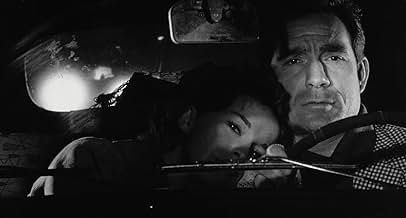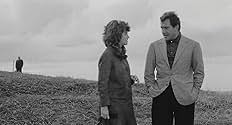Agrega una trama en tu idiomaFour short films by four different directors dealing with the principles of modern life.Four short films by four different directors dealing with the principles of modern life.Four short films by four different directors dealing with the principles of modern life.
- Premios
- 1 premio ganado en total
- Husband (segment "Il nuovo mondo")
- (as Jean Marc Bory)
- The son (segment "Il pollo ruspante")
- (as Riky Tognazzi)
- Stripteaser (segment "La ricotta")
- (sin créditos)
- Woman at Banquet (segment "La ricotta")
- (sin créditos)
- Productor's Wife (segment "La ricotta")
- (sin créditos)
Opiniones destacadas
"Illibatezza" by Roberto Rossellini. The story of an Alitalia hostess victim of what today we'd call a "stalker" who suffers from Oedipus complex. A simple, linear tale, although not immediately clear in its goal, in which the true star is the gorgeous Rosanna Schiaffino. In the American I can't help but see Rossellini's own sexual desire, probably participating in the act through his alter ego. Unfortunately Bruce Balaman (whose career counts only a couple of films) is not as captivating as the female lead, and the use of dubbing on the speaking actor makes things worse for him. It's interesting to note that Anna Maria admits to being obsessed with filming and taking pics of everything she experiences in everyday life, just like today's social networks invite us to do. This is a decisive cut from the author's Catholic phase and a change for the better, without ideological powers pressing on him. 8
"Il Nuovo Mondo" by Jean-Luc Godard. Godard never misses the chance to create something extremely unusual and destabilizing for the viewer, who is challenged to appreciate a language never before used in cinema. The short is about a possible future where an atomic bomb has been dropped near Paris and the psychological outcome this event has over the Parisiennes. The whole story is narrated in first person by the protagonist in voice over, which gives the feeling of reading a diary or a novel, except for a short dialogue between him and his lover (or, rather, "ex-lover"), whom appears to feel nothing anymore. Actually, the whole city "has changed", meaning that the fear of atomic destruction makes everyone's lives numb, with the help of some mysterious pill everybody seems to be taking. What Godard is showing us is the exact opposite of what we'd think a nuclear war would look like: apart from the screams and death of those directly hit by the bombs, everyone else would lose their interest in life, dragging a nihilistic existence, just like Alexandra does. Godard's signature features (jump cuts vs long takes) are there more than ever, with a beautiful fight between melancholy (underlined by the classical music) and raw truth (the fast cuts in the city). 8
"La ricotta" by Pier Paolo Pasolini. This is the most significant and historically important of the four films, so much that many consider this part more cinematically relevant than the whole container Ro.Go.Pa.G. Pasolini was sentenced to four months of reclusion for "contempt of the State religion", and the version we have public access to is a lot different than the original. It is a story about Stracci, a poor man working in the outskirts of Rome as an extra in a colossal about the Passion of Christ. Pasolini's message is very clear: we care more about the passion of the supposed son of God than of his sons'. Thus, while Stracci finally gets his desired meal, the saints in the movie laugh at him and cause his end. On the other hand, the characters of the director (Orson Welles!) and the journalist give out Pasolini's view of society, with the middle man being a "monstruosity" who doesn't understand deep thoughts but only his stupid, futile desires (like the dog). The film manages to be funny and extremely tragic at the same time, and the dycotomy between black-and-white actual world and colored fiction (and also between twist and classical music) explain through sensory experience the gap between reality and what show business wants us to believe. 9
"Il pollo ruspante" by Ugo Gregoretti. Of the four, "Il pollo ruspante" is the least interesting short. It is a critique of post-war Italian society, after the economic boom that made the nation and its inhabitants much richer and caused the birth of a larger middle-class. The events are narrated through a commerce professor who speaks using a laryngophone (which somewhat dehumanizes him) and lived by a family of four led by the greatly funny Ugo Tognazzi. Although it has some smart moments, the message underlying lies too much on the surface, making it so explicit that becomes bothering, especially when the customers at the restaurant literally become battery-bred chicken. While the other directors managed to make their films secretly full of meaning, Gregoretti tries way too hard to make everyone in the audience understand everything. Still, Tognazzi is always a delight to watch, and the situations are too surreal to plainly hate them. 7
Overall rating: 8
Godard's atmospheric episode examines post-nuclear effects on human behavior and is a clear criticism on nuclear policy, Moscow and absolutism (notice the newspaper headlines, and the way Alessandra keeps robotically repeating "Absolutely"). It's also a study on Alexandra Stewart's beauty and on sound editing. But above all it revisits the lovers'-quarrel-in-an-apartment-theme so dear to Godard (cf. "Breathless", "Une Femme est une Femme"), preparing his extraordinary 30min chef-d'oeuvre apartment sequence in "Le Mépris", his next film, and is in some ways a sketch for his later "Alphaville".
Pasolini's "La Ricotta" must rank among his best. It has: a) beautiful color tableaux of the crucifixion, emulating Italian Renaissance painting, especially the Florentines; b) a Fellini-like taste in movement, humor, overlapping dialog and crowd directing; c) contagious Italian pop theme by Carlo Rustichelli; d) Orson Welles's (whose great effort here is to manage reading his cue cards in Italian) self-mocking/realistic character -- a once famous American director who is forced in his decadent years to film low-budget epic films in Italy; e) Pasolini's beautiful, prophetic poem from his Mamma Roma's film journal about artists who are caught in "the borders of the eras"; f) of course, an acid criticism on capitalism and the bourgeoisie; and g) a joyful attempt to humanize (i.e. anti-deify) Jesus and the Gospel, much in the way Rossellini had done with the life of St. Francis of Assisi in 1950's "Francesco Giullare di Dio". Pasolini had to face ferocious Vatican confrontation and lawsuits because of this episode, but he went on to make the revolutionary and much misunderstood "The Gospel According to St. Matthew" in 1964.
Very interesting note: in the Italian language version (which is of course post-dubbed, as is the norm in Italian cinema) when the journalist asks the director (Welles) what he thinks about "the great Italian director Federico Fellini" you can see the Italian actor who plays the journalist clearly articulating "...the great Italian director Pier Paolo Pasolini"!!! It says a lot about Pasolini's fame even then and also about how Pasolini mended his coup de vanité in the dubbing so as to finally use the name of his friend Fellini. Oh, and by the way Welles's answer is: "Egli danza....egli danza!" which means "he dances...he dances!".
Gregoretti's episode "Il Pollo Ruspante" is well written and interesting, and impressively prophetic of the theories of consumerism and capitalism that are valid still today, in our "post-industrialized" world. Some scenes are too literal (like the one actually showing the chickens eating in a restaurant) and the end is a little bit too heavy, but it has pace and good acting.
Overall, Godard and Pasolini definitely make "Rogopag" a worthwhile film. If you're in a hurry you can (sorry to say) just skip Rossellini's episode. My vote for GOPA (Godard+Pasolini): 8/10. My vote for all ROGOPAG: 6/10.
The other short films by Rossellini, Godard and one more are not bad but very mediocre, Rossellini's attempt at some comedy is not altogether funny, Godard's attempt at some philosophical science fiction is far-fetched and unrealistic but will provide food for thought, while the last item is a terribly revolting satire. All four films are satirical, but Pasolini's is at least funny.
Pasolini's film is worth 10 points, Rossellini's snd Godard's 7, the last one only 4.
This is a movie about making a movie. Pasolini's film-within-a-film is about the death of Jesus. Orson Welles portrays the director of this movie. I read that we're supposed to understand that his career has declined to the point where he can only make low-budget movies in Italy. (That's reasonable enough, although I don't understand how we would know that.)
In Welles' movie, we learn that, with the exception of a few stars, who play Mary and Mary Magdalene, the rest of the cast are supposed to be local people from the surrounding poor community. (Some of them may actually be those local people, but one of the angels is played by Ettore Garofolo, who co-starred with Anna Magnani in "Mama Rosa.")
Mario Cipriani stars as Stracci, the character who portrays the Good Thief. There is a running joke throughout the movie about Stracci somehow missing out on every meal. He ultimately steals a dog and sells it to make money. Then he buys an immense amount of cheese. (That's where the title of "La Ricotta" comes from.)
The movie switches back and forth between color for the movie-within-a-movie, and black and white for the movie itself.
The whole movie has a rough, slapped together quality about it. It's not a great film, although reviewers who have seen all four segments say it's the best one.
We saw this film on the smal screen, because it was a bonus DVD packaged with the Pasolini movie "Mama Rosa." Mama Rosa is worth seeing. If you buy it as part of the Criterion Collection, you will have "La Ricotta." Because it's short, and it's there, I would watch it. I don't think it's worth seeking out otherwise.
¿Sabías que…?
- TriviaOrson Welles' voice was dubbed into Italian by another actor.
- ErroresIn the segment "La ricotta," Orson Welles is directing a "re-enactment" of the Crucifixion. It shows Jesus lying on top of a cross, tied down, while 4 men carry Christ and his cross up a hill. According to the Stations of the Cross, Christ carried his own cross.
- Citas
The Journalist (segment "La ricotta"): I hope I'm not disturbing. I'm a journalist. I'd like to get a little interview.
The 'Director' (segment "La ricotta"): No more than 4 questions.
The Journalist (segment "La ricotta"): Thank you. First, what do you mean to express with this new work?
The 'Director' (segment "La ricotta"): My intimate, profound archaic Catholicism.
The Journalist (segment "La ricotta"): Second, what do you think of Italian society?
The 'Director' (segment "La ricotta"): The most illiterate masses, and the most ignorant bourgeoisie in Europe.
The Journalist (segment "La ricotta"): And third, what do you think of death?
The 'Director' (segment "La ricotta"): As a Marxist, I never give it any thought.
The Journalist (segment "La ricotta"): Fourth and last question: What do you think of our great director Federico Fellini?
The 'Director' (segment "La ricotta"): He dances.
- Versiones alternativasThe Portuguese subtitled version was shown with episodes in a different order: first Frango no Campo / "Pollo rumpante, Il"; then O Novo Mundo / "Nuovo mondo, Il"; and last "Pureza" / "Illibatezza". Pasolini's episode was totally cut by the scissors of official censorship in the theatrical release.
- Bandas sonorasRicotta Twist
by Carlo Rustichelli
Selecciones populares
- How long is Ro.Go.Pa.G.?Con tecnología de Alexa
Detalles
- Tiempo de ejecución2 horas 2 minutos
- Color
- Mezcla de sonido
- Relación de aspecto
- 1.85 : 1
Contribuir a esta página




































